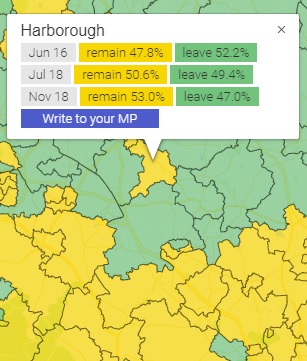Thousands of people have joined the Liberal Democrats since the election. Several friends interested in joining the party have asked me why I am a Liberal Democrat.
 What Prompted Me To Join In The First Place
What Prompted Me To Join In The First Place
I supported the Lib Dems and Liberal/SDP Alliance in the late 80s and early 90s because I thought UK politics needed something different from the old Labour/ Conservative swapping of government. At the time, they were economically between the two – a moderating position I favoured. They also had more detailed policies than the other parties, which gave me a clear idea of what I was supporting.
The first time that I was able to vote, there were no Liberal Democrats to vote for! The St. Neots Town Council Election for Eaton Ford ward of 1990 had 3 Tories and a Green to choose from. I realised that the way to ensure there was always a Lib Dem candidate was to stand myself or encourage others to do so – and that was achieved by joining the party.
A Liberal Political Education
I joined in 1991, although I had no particular idea what Liberalism was. My formal education was scientific not political. I read John Stuart Mill and articles about Social Liberalism to understand the party’s philosophy. The core principles that attract me to Liberalism are:
Individuality over the “tyranny of the majority”. Mill identified the need for government to safeguard the rights of minorities in society. This is why representative, as opposed to delegated, democracy is so important. This point is closely linked to the next one:
Control of authority. Liberals are suspicious of authority. Power and decision-making must be scrutinised and exercised with due consideration. Rights of citizens must be protected and strong constitutional checks put in place. The issue of individual rights is reflected in:
The Harm Principle: “The only purpose for which power can be rightfully exercised over any member of a civilised community against (their) will is to prevent harm to others.”
These ideas from Mill have been complemented by the advent of Social Liberalism – a belief that the state has a role in redistributing (particularly unearned) wealth and opportunity thereby helping every citizen to realise their full potential.
The Preamble and How the Party Works

 These liberal ideas are summarised in the above statement, taken from the Preamble to the Federal Constitution of the Liberal Democrats. Many members and supporters, including myself, use it as a touch-stone for our political thinking.
These liberal ideas are summarised in the above statement, taken from the Preamble to the Federal Constitution of the Liberal Democrats. Many members and supporters, including myself, use it as a touch-stone for our political thinking.
I soon discovered that the Lib Dems are very keen on internal party democracy. They were one of the first parties to have one member one vote to choose the party’s leader.
Policy is formed by dedicated working groups and are often evidence-based. Policy papers and motions from this process are then debated by Federal Conference twice a year and by Scottish, Welsh and Regional Conferences where appropriate. Conference representatives from each constituency can propose and amend policy at Conference, as can local parties. The party then compiles a manifesto from these policies for a particular election.
As happened in 2010, any coalition agreement has to be debated and passed by a Special Conference of over 2000 representatives.
Policy
Policies were the first thing that attracted me to the Liberal Democrats. Here are they key ones that still resonate with me today:
Proportional Representation for Westminster Elections using the Single Transferrable Vote: vital to empower voters and stimulate new political ideas and policy. Our existing system in deeply conservative. Parties are able to govern on unrepresentative minority vote shares by targeting small sets of swing voters to the exclusion of the everything else.
A Written Constitution: The UK is governed by precedent. Mill identified the dangers in this approach and the need for strong rules to control authority. A written constitution would deliver this.
 Devolution and Federalism: This enables power to be exercised by the most local and relevant democratic bodies, whether it be local councils, regional or national assemblies, Westminster or the EU. Federalism may be the only answer to nationalism in Scotland and the need to bring balance between the nations of the UK. Replacing the House of Lords with an Elected Senate is a key part of this solution.
Devolution and Federalism: This enables power to be exercised by the most local and relevant democratic bodies, whether it be local councils, regional or national assemblies, Westminster or the EU. Federalism may be the only answer to nationalism in Scotland and the need to bring balance between the nations of the UK. Replacing the House of Lords with an Elected Senate is a key part of this solution.
A Human Rights Act. Continued support for this against the Conservative threat is needed to protect individual liberty.
The Environment. The Lib Dems have been historically strong on the green agenda, applying Mill’s Harm Principle in the light of Climate Change. The coalition era saw some weakening of policy but I expect to see things improve over the coming years.
Financial Policy: The party has redistributed, and continues to look at redistributing, unearned wealth. Examples include the Mansion Tax, increasing Capital Gains Tax and closing tax loopholes (both implemented by Lib Dems in the last government) and clamping down on tax avoidance (netting £8 billion during 2010-15). I expect the party to look at lifting very low earners out of National Insurance and combining Income Tax and National Insurance to simplify the tax system.
The Individual: The Lib Dems successfully legalised same sex marriage in the last government. They have long argued for LGBT+ rights and equality and there is still a lot of work to do in this area.
Internationalism. The Liberal Democrats support international institutions such as the UN, EU and the rule of international law. They are strong supporters of International Aid and achieved the 0.7% of GDP target whilst in the coalition government.
 Conclusion
Conclusion
So this gives you some idea of why I am a member of the Liberal Democrats. I am not closed-minded or tribalist. From time to time I look at the other parties but it seems that I am a liberal and the only party for me is the Liberal Democrats.
If you are a liberal too, you can join online at www.libdems.org.uk

 What Prompted Me To Join In The First Place
What Prompted Me To Join In The First Place
 These liberal ideas are summarised in the above statement, taken from the Preamble to the Federal Constitution of the Liberal Democrats. Many members and supporters, including myself, use it as a touch-stone for our political thinking.
These liberal ideas are summarised in the above statement, taken from the Preamble to the Federal Constitution of the Liberal Democrats. Many members and supporters, including myself, use it as a touch-stone for our political thinking. Devolution and Federalism: This enables power to be exercised by the most local and relevant democratic bodies, whether it be local councils, regional or national assemblies, Westminster or the EU. Federalism may be the only answer to nationalism in Scotland and the need to bring balance between the nations of the UK. Replacing the House of Lords with an Elected Senate is a key part of this solution.
Devolution and Federalism: This enables power to be exercised by the most local and relevant democratic bodies, whether it be local councils, regional or national assemblies, Westminster or the EU. Federalism may be the only answer to nationalism in Scotland and the need to bring balance between the nations of the UK. Replacing the House of Lords with an Elected Senate is a key part of this solution. Conclusion
Conclusion